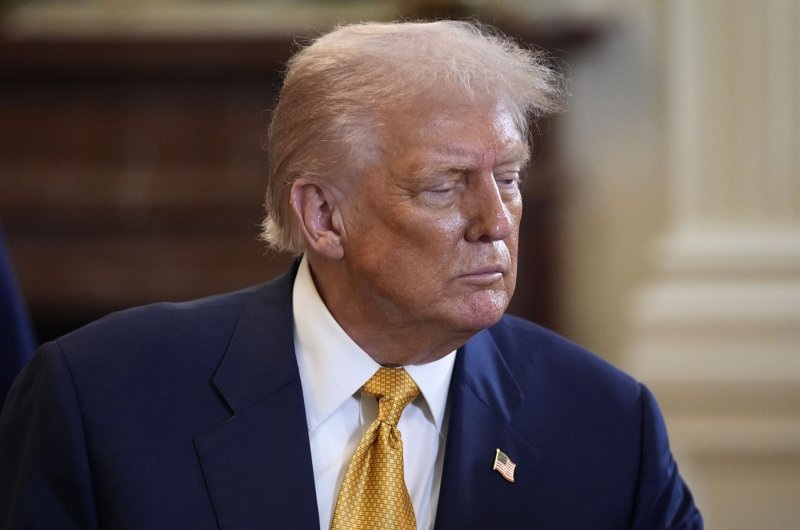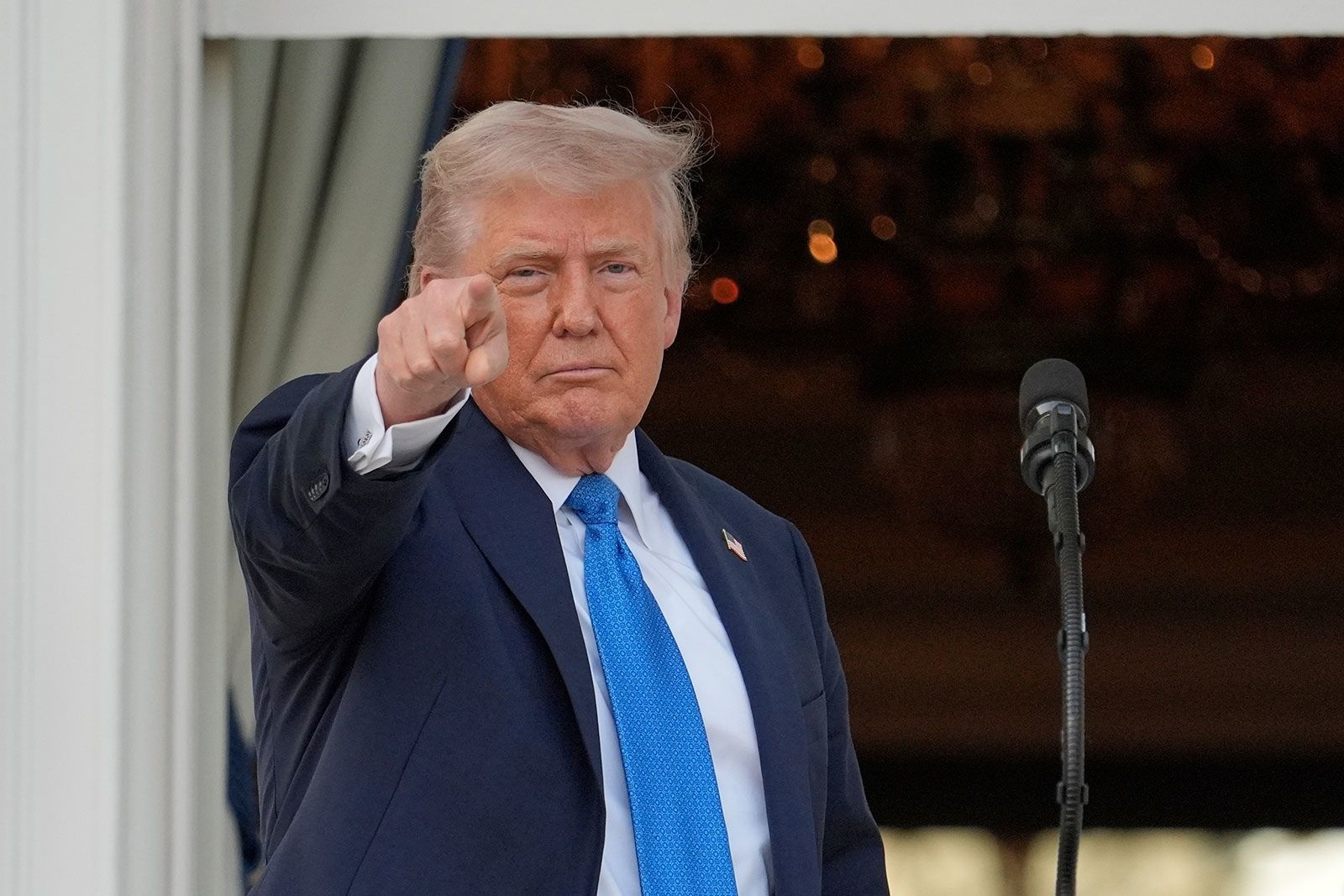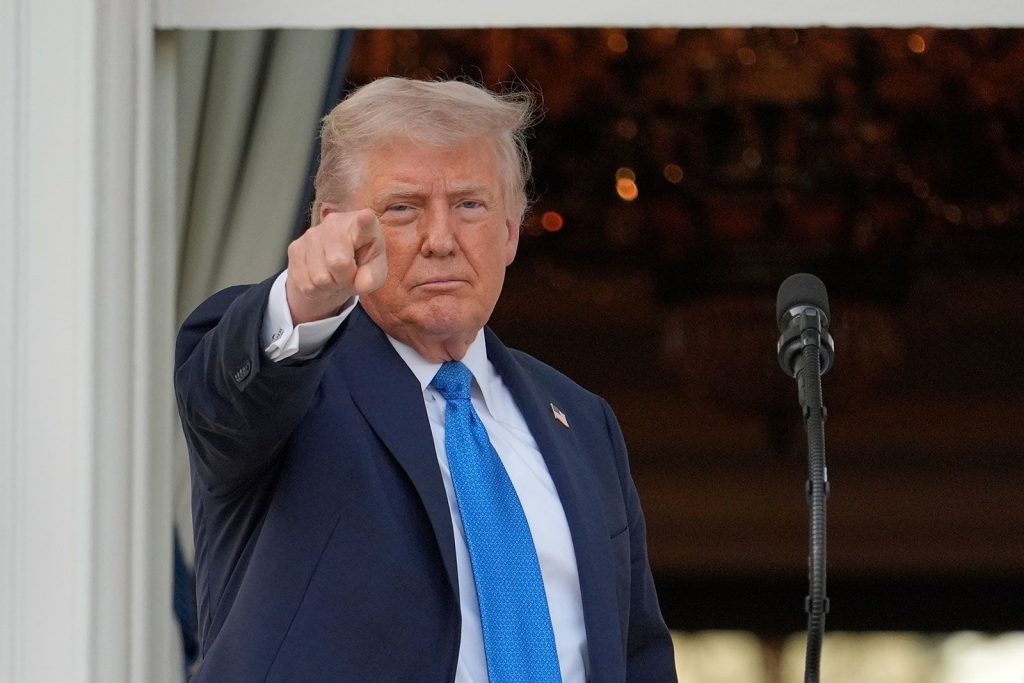News
Trump’s Citizenship Crackdown Collapses in Court

President Donald Trump’s attempt to eliminate birthright citizenship has encountered a significant legal setback.
A federal appeals court in San Francisco has ruled that the controversial executive order is unconstitutional, echoing earlier decisions from other courts.
A three-judge panel from the 9th U.S. Circuit Court of Appeals unanimously upheld a district court ruling from New Hampshire that had already blocked the order.
The appellate court stated that the lower court had made the correct call in striking down the measure, which sought to deny U.S. citizenship to individuals born on American soil under certain conditions.
“The district court correctly concluded that the executive order’s proposed interpretation, denying citizenship to many persons born in the United States, is unconstitutional.
“We fully agree,” the appellate judges wrote in their opinion.
This ruling moves the case one step closer to the U.S. Supreme Court, where it is expected to face intense scrutiny and possibly set a pivotal legal precedent.
The executive order at the center of the controversy was signed by Trump on January 20, shortly after he returned to office.
It immediately drew widespread legal challenges, with courts across the country filing injunctions within weeks to halt its implementation.
The core legal principle under debate is birthright citizenship, the constitutional guarantee that nearly all individuals born on U.S. soil automatically receive U.S. citizenship.
While the Trump administration escalated the issue to the Supreme Court, the justices refrained from addressing the central legal question.
Instead, they ruled that several lower courts had overstepped their authority by issuing broad injunctions, subtly reshaping how such nationwide rulings can be issued.
However, the high court did not weigh in on whether denying birthright citizenship itself would be lawful.
This left an opening for opponents of the order to pivot their legal strategy.
In a notable ruling, Judge Joseph LaPlante in New Hampshire classified all newborns in the United States as a legally affected group, enabling a class-action lawsuit.
He argued that stripping these individuals of automatic citizenship would inflict “irreparable harm.”
The idea of birthright citizenship has deep constitutional roots.
It is enshrined in the 14th Amendment, ratified in 1868 to grant citizenship to formerly enslaved individuals and overturn the infamous Dred Scott decision of 1857, which denied citizenship to African Americans.
The principle was reinforced in 1898 by the Supreme Court’s decision in United States v. Wong Kim Ark.
It upheld the citizenship of a man born in the U.S. to Chinese immigrant parents despite the restrictions of the Chinese Exclusion Act.
Although Indigenous Americans were initially excluded from this right, they were granted birthright citizenship with the passage of the Indian Citizenship Act of 1924.
Efforts to roll back birthright citizenship have long circulated among conservative circles, surfacing intermittently in Congress since 1991.
However, Trump’s executive order marked the most aggressive and mainstream push yet to challenge the constitutional guarantee.
Critics argue that the order not only defies the Constitution but also undermines the principles of equality and due process.
Legal scholars and civil rights organizations have condemned the effort, warning that its implementation would create a stateless underclass and legal chaos for millions.
Despite the legal defeats, the Trump administration has not yet issued a public response to the appellate court’s ruling.
The lack of comment leaves open questions about whether the administration will seek to fast-track the appeal to the Supreme Court or abandon the effort altogether.
In the meantime, legal experts anticipate that the case will continue to serve as a constitutional flashpoint.
With political and ideological tensions running high, the debate over birthright citizenship is poised to remain a major issue in future elections and judicial appointments.
The 9th Circuit’s decision is a strong affirmation of a long-standing constitutional protection, but whether it will withstand the Supreme Court’s final judgment remains to be seen.
Until then, the future of birthright citizenship in the United States remains uncertain, but, for now, firmly intact.
News
VIRAL VIDEO: Moment Yahaya Bello Orders Kogi State House Members to Sit on Floor, Gives Strict Directives

A viral video circulating on social media has captured former Kogi State Governor Yahaya Bello making newly elected State House of Assembly member, Hassan Shado, and his supporters sit on the floor during a meeting in Abuja.
The meeting took place at Bello’s residence on Monday, where he received members of the All Progressives Congress (APC) to discuss party unity and responsibilities.
Shado, who won the Dekina-Okura II State Constituency by-election on August 16, was formally presented to the former governor.
INEC declared Shado the winner after he polled 55,073 votes, defeating Godwin Meliga of the PDP, who garnered 1,038 votes.
During the session, Bello emphasized that Shado must strictly obey the directives of Governor Ahmed Usman Ododo in all legislative matters.
He drew his ear to stress the importance of cooperation, warning the lawmaker to align with Assembly decisions even when he did not fully understand them.
Bello said, “Go and cooperate with the Speaker and other members of the House of Assembly. Support Governor Ododo in everything that comes to the Assembly, even if you don’t understand it.”
Bello also reminded Shado that political victories are collective achievements.
He stated, “No candidate wins an election alone. Your people worked tirelessly from nomination to election day. Do not let them down.”
He urged inclusivity, consultation, and collective leadership, emphasizing that unity remains the key to APC’s continued success in Kogi State.
The former governor praised the people of Kogi East for demonstrating unity, which he said had been lacking in the past.
He further expressed confidence that APC would retain all major political positions in upcoming elections, declaring, “Our President, Bola Tinubu, will be re-elected.
Governor Ododo will be re-elected. All our candidates will continue to win on our great party’s platform.”
Bello’s post-governorship period has been marked by controversy.
The EFCC accused him of diverting over N110 billion from Kogi State coffers during his tenure.
He evaded multiple court summons and even a failed arrest in Abuja that led to a shootout. Ultimately, Bello surrendered to the EFCC on November 26, 2024, after months of avoiding legal proceedings.
Despite his legal troubles, Bello maintains influence over APC lawmakers in Kogi and continues to assert political authority, as shown in the recent video with Shado.
Watch the video below.
Africa
Why Every Nigerian Should Learn Combat Skills — CDS

The Chief of Defence Staff (CDS), General Christopher Musa, has urged all Nigerians to acquire combat skills such as Karate, Taekwondo, and Judo to protect themselves in the face of increasing danger.
Speaking on Channels Television’s Politics Today programme on Thursday, August 21, General Musa likened learning martial arts to other essential survival skills, including driving and swimming.
“That one should be taken as learning driving, learning how to swim.
Whether we have war or not, it is a survival instinct,” he said.
He added that in Europe, swimming and basic security education are compulsory because citizens must understand and practice personal safety.
The defence chief emphasised that the National Youth Service Corps (NYSC) should incorporate unarmed combat training into its programme to prepare graduates for real-world threats.
He explained, “That’s what the NYSC is supposed to do, but the NYSC has been watered down to three weeks. Self-defence is very important.
Unarmed combat, swimming, driving these are critical aspects of human survival. We should never take them for granted because they prepare us for the future.”
General Musa further encouraged Nigerians to remain situationally aware of their environment, alerting authorities to any suspicious activities or individuals.
He said, “The world we are in now is dangerous. We have individuals who don’t mean people well. They kill for whatever reason.”
Highlighting evolving threats, General Musa disclosed that terrorists increasingly use gold to finance their operations.
He noted that complex international networks make it difficult to immediately expose or prosecute these financiers. “Gold is the main source.
They circulate it through various channels, including foreign links, which complicates intervention,” he explained.
General Musa acknowledged that bad roads and challenging terrains hinder rapid military response to attacks.
He said, “Many Nigerians expect immediate intervention from the Armed Forces without understanding the logistical challenges. By the time information reaches us, terrorists have already struck and vanished because they move more quickly in these regions.”
He added that improvised explosive devices (IEDs) in the North-East further slow troop movement.
Regarding the Southeast, General Musa noted that the arrest of pro-Biafran agitator Simon Ekpa in Finland in November 2024 has improved security in the region.
He said, “Troops are actively pursuing Ekpa’s lieutenants in Imo, Enugu, Anambra, Ebonyi, and Abia states. We will continue operations until all threats are neutralised.”
The CDS also praised the synergy among the Nigerian Army, Air Force, and Navy, which led to the arrest of Ansaru terrorist leaders, describing it as a major success in the fight against terrorism.
General Musa concluded by announcing an African Chiefs of Defence Staff conference to foster continental collaboration and enhance regional security efforts.
Health
Police Arrest Fake Doctor as Woman Dies During Abortion

Detectives from the Akwa Ibom State Police Command have arrested a man posing as a medical doctor following the death of a 35-year-old woman, Blessing Sunday Etim, during an alleged illegal abortion.
The suspect, identified as Sunday Okon Akpan, reportedly owns and operates the Full Life Medical Centre (FLMC) in Ikot Obio Odongo, Ibesikpo Asutan Local Government Area.
Deputy Superintendent of Police (DSP) Timfon John, the spokesperson for the Akwa Ibom Police Command, revealed that police launched a search for the victim after receiving a distress call from her mother.
DSP John stated that operatives acted quickly following the report, which indicated that Blessing had gone to work at the FLMC and never returned.
According to police reports, the suspect attempted to secretly dispose of the victim’s body in her room.
A co-tenant, who witnessed the act, raised an alarm, forcing the suspect to abandon the corpse and flee the scene.
Police quickly arrived at the scene, where detectives discovered a premature foetus, confirming the occurrence of an illegal abortion.
Police traced and arrested Sunday Okon Akpan, a resident of Afaha Offiong village, Nsit Ibom LGA.
Preliminary investigations indicate that the suspect is not a licensed medical doctor or nurse but a community health practitioner who allegedly used his clinic to perform illegal medical procedures, including abortions.
The health centre has since been found abandoned.
DSP John confirmed that the victim’s body has been deposited at a morgue for preservation and autopsy, while investigations continue to uncover more details surrounding the incident.
She also promised to update the public as the probe progresses.
This shocking incident highlights the dangers of unlicensed medical practitioners operating clinics and offering illegal procedures.
Police authorities are warning residents to verify the credentials of anyone offering medical services and to report suspicious activities to prevent similar tragedies.
As the investigation unfolds, Akwa Ibom police have vowed to ensure that justice is served, and the public remains safe from unqualified medical practitioners operating in the state.
News
Trump Orders Review of 55 Million US Visa Holders in Mega Crackdown

The Trump administration has announced a sweeping review of more than 55 million foreigners holding US visas, aiming to identify potential violations that could trigger visa revocation or deportation.
In a statement to The Associated Press, the State Department confirmed that all visa holders are now subject to “continuous vetting.”
Officials will examine any indicators of ineligibility, including overstaying authorised periods, criminal activity, threats to public safety, engagement in terrorism, or support for terrorist organisations.
If authorities find evidence of such violations, they will revoke the visa, and individuals already in the US could face immediate deportation.
Officials stressed that the review targets both individuals residing in the United States and those holding multiple-entry visas abroad.
Since assuming office, President Donald Trump has prioritized strict immigration enforcement, targeting not only undocumented migrants but also holders of student and visitor exchange visas.
The current vetting process extends far beyond prior reviews, potentially affecting individuals who initially received approval to stay in the US.
According to the Department of Homeland Security, last year the US had 12.8 million green-card holders and 3.6 million people on temporary visas.
Immigration policy expert Julia Gelatt of the Migration Policy Institute noted that the 55 million figure likely includes individuals living abroad with tourist or business visas. She questioned whether allocating resources to review people unlikely to return justifies the scale of the initiative.
Alongside the review, Secretary of State Marco Rubio announced on X that the US will immediately halt work visas for commercial truck drivers, citing safety risks and threats to American jobs.
“The increasing number of foreign drivers operating large tractor-trailer trucks on US roads is endangering American lives and undercutting the livelihoods of American truckers,” Rubio wrote.
The administration recently strengthened English proficiency requirements for foreign truckers following incidents where language barriers contributed to accidents. State Department officials confirmed they are pausing the processing of new work visas to reassess screening and vetting protocols.
“Ensuring that every driver meets the highest standards protects American workers and maintains a secure, resilient supply chain,” the department added.
Experts warn the broader implications of the review could ripple across the US economy. Edward Alden, senior fellow at the Council on Foreign Relations, explained that the administration’s policies aim to discourage companies, universities, and hospitals from employing foreign workers.
“The economic consequences will extend far beyond individual visas,” Alden said, emphasizing that employers risk compliance issues if they continue hiring foreign staff.
The review represents the most comprehensive enforcement action in recent US history and signals that the administration will aggressively monitor both legal and temporary visa holders to maintain national security and prioritize domestic employment.
News
2027: ADC Coalition Deceiving Nigerians – Baba-Ahmed

The 2023 Labour Party (LP) vice-presidential candidate, Datti Baba-Ahmed, has warned Nigerians that the opposition coalition under the African Democratic Congress (ADC) is giving false hope about rescuing the country from underdevelopment.
“They are deceiving us,” Baba-Ahmed said during an interview on Channels Television’s Politics Today on Friday.
Baba-Ahmed, who ran alongside Peter Obi in the 2023 presidential election won by Bola Tinubu of the All Progressives Congress (APC) expressed his willingness to be Obi’s running mate in the 2027 presidential election.
Although Obi has shown interest in the 2027 race and is aligning with ADC coalition figures such as David Mark, Atiku Abubakar, Nasir el-Rufai, Rotimi Amaechi, and Rauf Aregbesola, Baba-Ahmed stressed that he wants Obi to remain in the Labour Party and contest as its presidential candidate.
“I’m in the Labour Party. I’m a Peter Obi man. I still want Peter Obi to come back to the Labour Party and contest the 2027 election,” Baba-Ahmed stated.
When asked about his plans for the 2027 race, Baba-Ahmed confirmed his readiness to serve as a running mate for like-minded leaders committed to restoring Nigeria.
“If Nigeria is still around and there is an electoral system to follow, my love for Nigeria is undying.
I would appropriately associate with groups and individuals aligned with restoring the nation,” he said.
Baba-Ahmed also revealed two potential leaders he would consider deputising, with Peter Obi being his primary choice. “The first one has not said anything.
The second one is Peter Obi. I’m always with Peter Obi until he decides not to,” he added.
-

 Featured4 days ago
Featured4 days agoYour Attacks on Peter Obi Are Petty, Stop It! Chekwas Rebukes Soludo
-

 News4 days ago
News4 days agoTension in Anambra community as senior police officer shoots kinsman dead
Colleagues, others try cover-up; victim's family fights back
-

 News7 days ago
News7 days agoAnambra South Bye-Election: APC Chief Rescues Deputy Gov Caught In Vote Buying From Angry Youths
By Chuks Collins, Awka
-

 Celebrity/Entertainment24 hours ago
Celebrity/Entertainment24 hours agoHow Nigerian TikToker Geh Geh Made ₦45 Million in One Night
-

 News5 days ago
News5 days agoNigerian visa applicants must provide 5-yr social media history — US embassy
-

 Analysis6 days ago
Analysis6 days agoSystemic Sabotage: How APC, INEC Colluded To Undermine Amamgbo’s Senatorial Bid
By Arthur Ezechukwu
-

 News3 days ago
News3 days agoTerrorist Organisation: APC, PDP Members in US, UK, France Risk Deportation
-

 Celebrity/Entertainment5 days ago
Celebrity/Entertainment5 days agoWhy single mothers can’t raise boys into proper men — Jim Iyke
-

 News7 days ago
News7 days agoBREAKING: Troops arrest Nigeria’s most wanted terror kingpin
-

 News2 days ago
News2 days agoVandal electrocuted while vandalizing Aba power infrastructure








